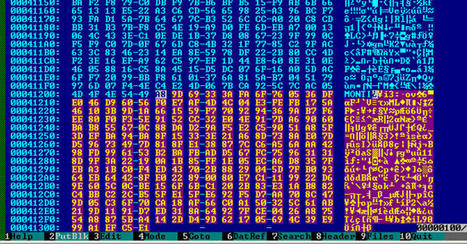 Your new post is loading...
 Your new post is loading...

|
Scooped by
Gust MEES
|

|
Scooped by
Gust MEES
|
The fake TradingView website is hosted on trabingviews[.]com, with special font characters being used to make it look like the legitimate domain and help it avoid detection.
The malicious website is designed to look authentic, claiming to offer downloads for the TradingView app’s Windows, macOS and Linux versions.
While the Windows and Linux files deliver the NetSupport RAT, the Mac file delivers the AMOS malware. Learn more / En savoir plus / Mehr erfahren: https://www.scoop.it/topic/securite-pc-et-internet

|
Scooped by
Gust MEES
|
Since at least May 2021, stealthy Linux malware called AVrecon was used to infect over 70,000 Linux-based small office/home office (SOHO) routers to a botnet designed to steal bandwidth and provide a hidden residential proxy service.
This allows its operators to hide a wide spectrum of malicious activities, from digital advertising fraud to password spraying.
According to Lumen's Black Lotus Labs threat research team, while the AVrecon remote access trojan (RAT) compromised over 70,000 devices, only 40,000 were added to the botnet after gaining persistence. Learn more / En savoir plus / Mehr erfahren: https://www.scoop.it/t/securite-pc-et-internet/?&tag=Linux

|
Scooped by
Gust MEES
|
Technical information has emerged for a serious vulnerability affecting multiple Linux kernel versions that could be triggered with "minimal capabilities." The security issue is being referred to as StackRot (CVE-2023-3269) and can be used to compromise the kernel and elevate privileges.
A patch is available for the affected stable kernels since July 1st and full details about the issue along with a complete exploit code are expected by the end of the month. Learn more / En savoir plus / Mehr erfahren: https://www.scoop.it/t/securite-pc-et-internet/?&tag=Linux

|
Scooped by
Gust MEES
|
A pervasive cyber-espionage group known as Iron Tiger, believed to be out of China, has updated one of its malware frameworks to attack Linux-based systems.
Researchers at Trend Micro recently discovered that Iron Tiger (aka Emissary Panda or APT27) had added new features to its so called SysUpdate malware family, which allows it to infect Linux platforms in addition to Windows. SysUpdate abuses system services, grabs screenshots, browses and terminates processes, retrieves drive information, executes commands, and can find, delete, rename, upload, and download files as well as peruse a victim's file directory. Learn more / En savoir plus / Mehr erfahren: https://www.scoop.it/t/securite-pc-et-internet/?&tag=Linux

|
Scooped by
Gust MEES
|
Flaws in networkd-dispatcher, a service used in the Linux world, can be exploited by a rogue logged-in user or application to escalate their privileges to root level, allowing the box to be commandeered, Microsoft researchers said Wednnesday.
It's nice of Redmond to point out these flaws and have them fixed in any affected distributions; the US tech giant is a big user of Linux and relies on the open-source OS throughout its empire. It's just a little perplexing the biz went to all the effort of a big write-up and giving the flaws a catchy name, Nimbuspwn, when countless privilege-elevation holes are fixed in its Windows operating system each month, and we can't recall Microsoft lately making this much of a song and dance over them. Learn more / En savoir plus / Mehr erfahren: https://www.scoop.it/t/securite-pc-et-internet/?&tag=Linux

|
Scooped by
Gust MEES
|

|
Scooped by
Gust MEES
|
If it's not one thing, it's another. After one real Linux problem -- the heap overflow bug in the Linux kernel's fs/fs_context.c program -- is found and fixed, then a new security problem is discovered. This time security company Qualys has uncovered a truly dangerous memory corruption vulnerability in polkit's pkexec, CVE-2021-4034.
Polkit, formerly known as PolicyKit, is a systemd SUID-root program. It's installed by default in every major Linux distribution.
How dangerous is it? Very. Learn more / En savoir plus / Mehr erfahren: https://www.scoop.it/t/securite-pc-et-internet/?&tag=Linux

|
Scooped by
Gust MEES
|

|
Scooped by
Gust MEES
|
The Hive ransomware gang now also encrypts Linux and FreeBSD using new malware variants specifically developed to target these platforms.
However, as Slovak internet security firm ESET discovered, Hive's new encryptors are still in development and still lack functionality.
The Linux variant also proved to be quite buggy during ESET's analysis, with the encryption completely failing when the malware was executed with an explicit path.

|
Scooped by
Gust MEES
|
Microsoft is warning customers about the LemonDuck crypto mining malware which is targeting both Windows and Linux systems and is spreading via phishing emails, exploits, USB devices, and brute force attacks, as well as attacks targeting critical on-premise Exchange Server vulnerabilities uncovered in March.
The group was discovered to be using Exchange bugs to mine for cryptocurrency in May, two years after it first emerged.
Notably, the group behind LemonDuck is taking advantage of high-profile security bugs by exploiting older vulnerabilities during periods where security teams are focussed on patching critical flaws, and even removing rival malware. Learn more / En savoir plus / Mehr erfahren: https://www.scoop.it/topic/securite-pc-et-internet

|
Scooped by
Gust MEES
|
Three recently unearthed vulnerabilities in the Linux kernel, located in the iSCSI module used for accessing shared data storage facilities, could allow root privileges to anyone with a user account.
The trio of flaws – CVE-2021-27363, CVE-2021-27364 and CVE-2021-27365 – have lurked in Linux code since 2006 without detection until GRIMM researchers discovered them.
“If you already had execution on a box, either because you have a user account on the machine, or you’ve compromised some service that doesn’t have repaired permissions, you can do whatever you want basically,” said Adam Nichols, principal of the Software Security practice at GRIMM.
While the vulnerabilities “are in code that is not remotely accessible, so this isn’t like a remote exploit,” said Nichols, they are still troublesome. They take “any existing threat that might be there. It just makes it that much worse,” he explained. “And if you have users on the system that you don’t really trust with root access it, it breaks them as well.”
Referring to the theory that ‘many eyes make all bugs shallow,’ Linux code “is not getting many eyes or the eyes are looking at it and saying that seems fine,” said Nichols. “But, [the bugs] have been in there since the code was first written, and they haven’t really changed over the last 15 years.” Learn more / En savoir plus / Mehr erfahren: https://www.scoop.it/t/securite-pc-et-internet/?&tag=Linux

|
Scooped by
Gust MEES
|
Rising Linux security developer Alexander Popov of London-based Positive Technologies discovered and fixed a set of five security holes in the Linux kernel's virtual socket implementation. An attacker could use these vulnerabilities (CVE-2021-26708) to gain root access and knock out servers in a Denial of Service (DoS) attack.
With a Common Vulnerability Scoring System (CVSS) v3 base score of 7.0, high severity, smart Linux administrators will patch their systems as soon as possible.
While Popov discovered the bugs in Red Hat's community Linux distribution Fedora 33 Server, it exists in the system using the Linux kernel from November 2019's version 5.5 to the current mainline kernel version 5.11-rc6. Learn more / En savoir plus / Mehr erfahren: https://www.scoop.it/t/securite-pc-et-internet/?&tag=Linux
|

|
Scooped by
Gust MEES
|
A reported Free Download Manager supply chain attack redirected Linux users to a malicious Debian package repository that installed information-stealing malware.
The malware used in this campaign establishes a reverse shell to a C2 server and installs a Bash stealer that collects user data and account credentials.
Kaspersky discovered the potential supply chain compromise case while investigating suspicious domains, finding that the campaign has been underway for over three years. Learn more / En savoir plus / Mehr erfahren: https://www.scoop.it/t/securite-pc-et-internet/?&tag=Linux

|
Scooped by
Gust MEES
|

|
Scooped by
Gust MEES
|
Kryptomining-Malware versteckt sich ausschließlich im Ram
Ein Python-Skript namens Pyloose hat es auf Linux-Systeme abgesehen, um direkt aus dem Arbeitsspeicher heraus Kryptowährungen zu schürfen.

|
Scooped by
Gust MEES
|
A new Linux NetFilter kernel flaw has been discovered, allowing unprivileged local users to escalate their privileges to root level, allowing complete control over a system.
The CVE-2023-32233 identifier has been reserved for the vulnerability, but a severity level is yet to be determined. Learn more / En savoir plus / Mehr erfahren: https://www.scoop.it/t/securite-pc-et-internet/?&tag=Linux

|
Scooped by
Gust MEES
|
Une grave faille de sécurité affecte le noyau Linux
Sécurité : La faille de sécurité affecte ksmbd, un serveur SMB intégré au noyau de Linux 5.15, et sa note de gravité avoisine le 10, selon la ZDI.
Joyeux Noël à tous les administrateurs de systèmes Linux ! Et en guise de cadeau : une grave faille de sécurité dans le noyau Linux.
C’est la Zero Day Initiative (ZDI), une société de recherche sur les failles zero-day, qui l’a découverte et annoncée juste avant le réveillon.
Cette vulnérabilité pourrait permettre à un attaquant à distance authentifié de divulguer des informations sensibles et d’exécuter du code sur les versions vulnérables du noyau Linux.

|
Scooped by
Gust MEES
|
Behind almost all Linux firewalls tools such as iptables; its newer version, nftables; firewalld; and ufw, is netfilter, which controls access to and from Linux's network stack. It's an essential Linux security program, so when a security hole is found in it, it's a big deal.

|
Scooped by
Gust MEES
|
Triviale Linux-Lücke ermöglicht Root-Rechte
Zum Ausnutzen der Sicherheitslücke in Polkit muss der Dienst nur installiert sein. Das betrifft auch Serversysteme. Exploits dürften schnell genutzt werden. Learn more / En savoir plus / Mehr erfahren: https://www.scoop.it/t/securite-pc-et-internet/?&tag=Linux

|
Scooped by
Gust MEES
|

|
Scooped by
Gust MEES
|
Rechenfehler im Linux-Kernel erlaubt Rechteausweitung
Vor allem in Cloud-Systemen problematisch: An Linux-Systemen angemeldete Nutzer könnten aufgrund eines potenziellen Pufferüberlaufs ihre Rechte ausweiten. Learn more / En savoir plus / Mehr erfahren: https://www.scoop.it/t/securite-pc-et-internet/?&tag=Linux

|
Scooped by
Gust MEES
|
Microsoft has continued its analysis of the LemonDuck malware, known for installing crypto-miners in enterprise environments. It makes a strong case for why it is worth removing it from your network.
This group, according to Microsoft, has a well-stocked arsenal of hacking tools, tricks and exploits aimed at one thing: for their malware to retain exclusive access to a compromised network for as long as possible.
While crypto-mining malware could be just a nuisance, LemonDuck attributes suggest the attacker group really do try to own compromised networks by disabling anti-malware, removing rival malware, and even automatically patching vulnerabilities -- a competitive effort to keep rival attackers from feeding off its turf. Learn more / En savoir plus / Mehr erfahren: https://www.scoop.it/topic/securite-pc-et-internet

|
Scooped by
Gust MEES
|
An information disclosure vulnerability in the Linux kernel can be exploited to leak data and act as a springboard for further compromise.
Disclosed by Cisco Talos researchers on Tuesday, the bug is described as an information disclosure vulnerability "that could allow an attacker to view Kernel stack memory."
The kernel is a key component of the open source Linux operating system. The vulnerability, tracked as CVE-2020-28588, was found in the proc/pid/syscall functionality of 32-bit ARM devices running the OS.
According to Cisco, the issue was first found in a device running on Azure Sphere. Attackers seeking to exploit the security flaw could read the /syscall OS file via Proc, a system used for interfacing between kernel data structures. Learn more / En savoir plus / Mehr erfahren: https://www.scoop.it/t/securite-pc-et-internet/?&tag=Linux

|
Scooped by
Gust MEES
|
Researchers say the new RedXOR backdoor is targeting Linux systems with various data exfiltration and network traffic tunneling capabilities.
Researchers have discovered a new backdoor targeting Linux systems, which they link back to the Winnti threat group.
The backdoor is called RedXOR – in part because its network data-encoding scheme is based on the XOR encryption algorithm, and in part because its samples were found on an old release of the Red Hat Enterprise Linux platform. The latter fact provides a clue that RedXOR is utilized in targeted attacks against legacy Linux systems, noted researchers.
The malware has various malicious capabilities, said researchers – from exfiltrating data to tunneling network traffic to another destination. Learn more / En savoir plus / Mehr erfahren: https://www.scoop.it/t/securite-pc-et-internet/?&tag=Linux
|



 Your new post is loading...
Your new post is loading...
































Bootloader-Lücke gefährdet viele Linux-Distributionen
Im Bootloader shim, der Secure-Boot auch für nicht-Windows-Betriebssysteme erlaubt, klafft eine Sicherheitslücke.
Learn more / En savoir plus / Mehr erfahren:
https://www.scoop.it/t/securite-pc-et-internet/?&tag=Linux